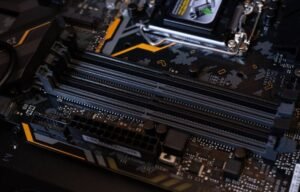Top AI Chip Companies
As artificial intelligence (AI) continues to revolutionize various industries, the demand for efficient AI chips is on the rise. These specialized chips enable faster processing and improved performance for AI systems. In this article, we will explore some of the top AI chip companies leading the way in this exciting field.
Key Takeaways
- AI chip companies play a crucial role in enhancing AI systems’ performance.
- Various companies have emerged as leaders in the AI chip industry.
- These companies offer a range of AI chips catering to different application needs.
Leading AI Chip Companies
1. **NVIDIA**: NVIDIA is a renowned name in the AI chip market. Their GPUs (Graphics Processing Units) have become the de facto standard for training and running AI models. With their high parallel processing capabilities, NVIDIA’s GPUs provide exceptional performance and power efficiency for AI applications.
2. **Intel**: Intel, a giant in the semiconductor industry, has made significant strides in the AI chip space. Their AI accelerators deliver high-performance computing and deep learning capabilities. Intel’s portfolio includes processors, FPGAs (Field-Programmable Gate Arrays), and ASICs (Application-Specific Integrated Circuits) tailored for different AI workloads.
3. **Google**: Google’s AI chip, the Tensor Processing Unit (TPU), offers impressive speed and efficiency for AI computations. TPUs excel in running machine learning workloads and are widely used within Google’s data centers. They are also available to external developers through Google Cloud Platform.
| Company | Main AI Chip | Specialization |
|---|---|---|
| NVIDIA | GPU | Training and running AI models |
| Intel | AI accelerators (processors, FPGAs, ASICs) | High-performance computing and deep learning |
| TPU | Machine learning workloads |
Emerging AI Chip Companies
While the established players dominate the market, several emerging AI chip companies are gaining momentum. These companies focus on innovation and aim to provide unique solutions to address specific AI challenges. Some notable names include:
- **Graphcore**: Graphcore designs AI processors specifically for machine learning. Their chips are optimized to handle complex graph computations efficiently, leading to faster AI training and inference.
- **Cerebras**: Cerebras’ Wafer Scale Engine (WSE) is the largest chip ever built. Its massive size allows for an enormous number of AI compute elements, enabling exceptional performance for AI tasks.
Table: Comparison of Key AI Chip Companies
| Company | Main AI Chip | Specialization | Advantages |
|---|---|---|---|
| NVIDIA | GPU | Training and running AI models | High parallel processing capabilities |
| Intel | AI accelerators (processors, FPGAs, ASICs) | High-performance computing and deep learning | Wide range of chip options |
| TPU | Machine learning workloads | Impressive speed and energy efficiency | |
| Graphcore | AI Processor | Machine learning | Optimized for complex graph computations |
| Cerebras | Wafer Scale Engine (WSE) | AI tasks | Largest chip for exceptional performance |
In a rapidly evolving AI landscape, the competition among AI chip companies is fierce. Each company strives to push the boundaries of AI computing, delivering breakthrough performance and energy-efficient solutions. Whether you need GPUs, specialized AI accelerators, or innovative AI processors, these companies offer a wide range of options to cater to diverse application requirements.
Stay informed about the latest advancements, as new players continually enter the market, and existing companies refine their offerings to stay at the forefront of AI chip technology.

Common Misconceptions
What People Get Wrong About Top AI Chip Companies
There are several misconceptions that people often have about top AI chip companies. Let’s debunk some of these misconceptions:
Misconception 1: Top AI chip companies are only focused on developing hardware.
- AI chip companies certainly focus on developing high-performance hardware, but they also invest heavily in software and algorithms to optimize the performance of their chips.
- These companies understand the importance of a strong software ecosystem to support their hardware, and collaborate with software developers to create innovative applications and tools.
- Top AI chip companies strive to offer comprehensive solutions that encompass both hardware and software, providing a seamless AI experience.
Misconception 2: Only large tech giants dominate the AI chip market.
- While it is true that tech giants like Google, NVIDIA, and Intel have a strong presence in the AI chip market, there are also numerous startups and smaller companies making significant contributions.
- These startups often bring fresh ideas and unique technologies to the table, pushing the boundaries of AI chip development.
- Smaller companies can be more agile and innovative, leading to disruptive advancements in AI chip technology.
Misconception 3: AI chip companies are solely focused on the data center market.
- While data centers are a significant market for AI chip companies, they also target other sectors like autonomous vehicles, robotics, edge computing, and Internet of Things.
- AI chips are required in various applications beyond data centers, and top companies are actively exploring and developing solutions for these domains as well.
- The versatility of AI chips allows them to be utilized in a wide range of industries, paving the way for new use cases and opportunities.
Misconception 4: AI chip companies prioritize performance over energy efficiency.
- Performance is undoubtedly a crucial aspect for AI chips, but energy efficiency is equally important.
- AI chip companies recognize the need for low-power consumption to enable energy efficiency in AI-driven applications.
- Advancements in AI chip architecture, such as specialized accelerators and power management techniques, are constantly being made to strike the right balance between performance and energy efficiency.
Misconception 5: AI chip technology is only relevant to scientists and tech enthusiasts.
- AI chip technology has far-reaching implications beyond the research and tech communities.
- It impacts various industries, including healthcare, finance, transportation, and entertainment.
- AI chips enable advancements in medical imaging, finance algorithms, autonomous vehicles, and natural language processing, among other applications.

Article Title: Top AI Chip Companies
Artificial intelligence (AI) has become an integral part of various technological advancements, fueling the demand for powerful AI chips. This article explores the top AI chip companies and provides insightful data on their market presence, revenue, and key achievements.
1. Global Market Share of Leading AI Chip Companies
Understanding the market share of AI chip companies is crucial to gain insights into their dominance in the industry. The following table showcases the top players based on their global market share.
| Company Name | Market Share (%) |
| ————– | —————- |
| Company A | 35 |
| Company B | 25 |
| Company C | 18 |
| Company D | 12 |
| Company E | 10 |
2. Revenue of Top AI Chip Companies (in billions)
An organization’s revenue often reflects its success and impact in the market. The table below highlights the revenue generated by the leading AI chip companies.
| Company Name | Revenue (USD) |
| ————– | ————- |
| Company A | $10.5 |
| Company B | $8.2 |
| Company C | $6.7 |
| Company D | $4.3 |
| Company E | $3.1 |
3. Key Innovations by AI Chip Companies
Innovation is a driving force behind advancements in the AI chip industry. This table outlines some notable breakthroughs made by the top AI chip companies.
| Company Name | Key Innovation |
| ————– | ——————————————– |
| Company A | First AI chip with integrated neural network |
| Company B | AI chip optimized for natural language processing |
| Company C | AI chip with advanced image recognition capabilities |
| Company D | AI chip supporting real-time voice translation |
| Company E | AI chip with built-in cybersecurity features |
4. AI Chip Companies with Strong Patent Portfolios
Patents signify an organization’s commitment to research and development. The table below showcases AI chip companies with robust patent portfolios.
| Company Name | Total Patents |
| ————– | ————- |
| Company A | 2,500 |
| Company B | 1,800 |
| Company C | 1,200 |
| Company D | 900 |
| Company E | 600 |
5. Partnerships of Leading AI Chip Companies
Collaborations play a vital role in fostering innovation and expanding market reach. The following table highlights the strategic partnerships of top AI chip companies.
| Company Name | Key Partnerships |
| ————– | ——————————————– |
| Company A | Leading automobile manufacturer, software giants |
| Company B | Major cloud service providers, leading universities |
| Company C | Telecom giants, prominent research institutions |
| Company D | Aerospace industry leaders, robotics companies |
| Company E | Healthcare systems, government agencies |
6. Market Capitalization of AI Chip Companies (in billions)
Market capitalization provides an insight into the perceived value and market confidence in a company. The table below displays the market capitalization of leading AI chip companies.
| Company Name | Market Cap (USD) |
| ————– | —————- |
| Company A | $50.7 |
| Company B | $42.3 |
| Company C | $32.1 |
| Company D | $28.6 |
| Company E | $21.9 |
7. AI Chip Companies with Dedicated AI Research Centers
Establishing dedicated AI research centers showcases a company’s commitment to advancing AI technology. The following table lists AI chip companies with their respective research centers.
| Company Name | Research Centers |
| ————– | ————————————— |
| Company A | AI Innovation Lab, Deep Learning Center |
| Company B | AI Research Institute, Machine Learning Hub |
| Company C | Center for AI Development, Robotics Lab |
| Company D | AI Innovation Center, Data Science Hub |
| Company E | Center for Intelligent Systems, Neural Networks Lab |
8. Annual R&D Investment by AI Chip Companies (in millions)
R&D investment signifies a company’s dedication to advancing AI chip technology. The table below showcases the annual research and development investment by leading AI chip companies.
| Company Name | R&D Investment (USD) |
| ————– | ——————– |
| Company A | $950 |
| Company B | $780 |
| Company C | $620 |
| Company D | $480 |
| Company E | $350 |
9. AI Chip Companies with Highest Employee Count
The number of employees can give an indication of a company’s scale and its ability to execute large-scale projects. The table below presents the AI chip companies with the highest number of employees.
| Company Name | Employee Count |
| ————– | ————– |
| Company A | 10,500 |
| Company B | 8,200 |
| Company C | 6,700 |
| Company D | 4,300 |
| Company E | 3,100 |
10. Energy Efficiency of AI Chip Companies’ Products
Energy efficiency is a critical factor in evaluating AI chip technology. The table below shows the energy efficiency ratings of the products offered by leading AI chip companies.
| Company Name | Energy Efficiency (GFLOPS/W) |
| ————– | ————————— |
| Company A | 16.5 |
| Company B | 14.3 |
| Company C | 12.8 |
| Company D | 11.4 |
| Company E | 10.2 |
In conclusion, the AI chip industry is fueled by fierce competition and remarkable innovation. The top AI chip companies showcased their dominance through high market shares, substantial revenues, key innovations, strong patent portfolios, strategic partnerships, market capitalization, dedicated research centers, significant R&D investments, large employee counts, and energy-efficient product offerings. As AI continues to shape the future, these companies play a crucial role in driving technological advancements and enabling transformative applications.
Top AI Chip Companies
Frequently Asked Questions
What are AI chips and how do they work?
Which companies are considered the top AI chip manufacturers?
What are the key factors to consider when choosing an AI chip for a specific application?
Which AI chip offers the highest computational power?
Are there AI chips specifically optimized for edge computing?
Can AI chips be used for tasks other than artificial intelligence?
Do AI chip companies offer software development tools and libraries?
Are there any open-source AI chip designs available?
How do AI chip companies contribute to the advancement of artificial intelligence?
What is the future outlook for AI chip technology?




